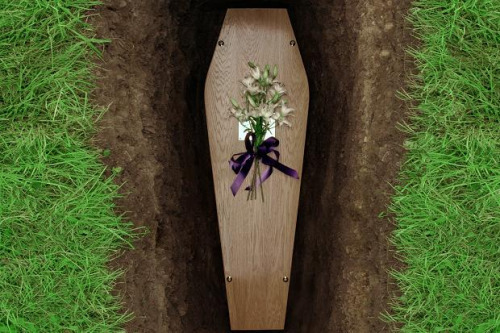Katherine Frances's Blog, page 398
February 20, 2015
"She found a way to kiss my soul. If you haven’t been kissed there, you haven’t been kissed at all."
“She found a way to kiss my soul. If you haven’t been kissed there, you haven’t been kissed at all.”
- VàZaki Nada (via wordsnquotes)
- VàZaki Nada (via wordsnquotes)
Published on February 20, 2015 06:43
sixpenceee:Methods of Death & How They FeelDrowning: When...

Methods of Death & How They Feel
Drowning: When victims eventually submerge, they hold their breath for as long as possible, typically 30 to 90 seconds. After that, they inhale some water, splutter, cough and inhale more. Survivors say there is a feeling of tearing and a burning sensation in the chest as water goes down into the airway. Then that sort of slips into a feeling of calmness and tranquility. That calmness represents the beginnings of the loss of consciousness from oxygen deprivation, which eventually results in the heart stopping and brain death.Heart Attack: The most common symptom is chest pain: a tightness, pressure or squeezing, often described as an “elephant on my chest”, which may be lasting or come and go. This is the heart muscle struggling and dying from oxygen deprivation. Pain can radiate to the jaw, throat, back, belly and arms. Other signs and symptoms include shortness of breath, nausea and cold sweats.
Bleeding to Death: Anyone losing 1.5 litres – either through an external wound or internal bleeding – feels weak, thirsty and anxious, and would be breathing fast. By 2 litres, people experience dizziness, confusion and then eventual unconsciousness.
Fire: Burns inflict immediate and intense pain through stimulation of the pain nerves in the skin. To make matters worse, burns also trigger a rapid inflammatory response, which boosts sensitivity to pain in the injured tissues and surrounding areas.As burn intensities progress, some feeling is lost but not much. 3rd degree burns don’t hurt as much as 2nd degree burns.
Decapitation: Very quick. Consciousness is said to continue for a few seconds after decapitation. It’s thought to be painless. But the separation of the spinal cord and brain may cause severe pain.
Electrocution: Higher currents can produce nearly immediate unconsciousness. The electric chair was designed to produce instant loss of consciousness and painless death, but that’s debatable. It’s been proposed that prisoners could instead be dying from heating of the brain, or perhaps from suffocation due to paralysis of the breathing muscles instead of electrocution itself because the skulls of the wall are a thick and powerful insulator.
Falling from a height: Another instantaneous death. Survivors of great falls often report the sensation of time slowing down. The natural reaction is to struggle to maintain a feet-first landing, resulting in fractures to the leg bones, lower spinal column and life-threatening broken pelvises. The impact traveling up through the body can also burst the aorta and heart chambers.
Hanging: The rope puts pressure on the windpipe and the arteries to the brain. This can cause unconsciousness in 10 seconds, but it takes longer if the noose is incorrectly sited. Witnesses of public hangings often reported victims “dancing” in pain at the end of the rope, struggling violently as they asphyxiated.
Lethal injection: . First comes the anaesthetic thiopental to speed away any feelings of pain, followed by a paralytic agent called pancuronium to stop breathing. Finally potassium chloride is injected, which stops the heart almost instantly. Eyewitnesses have reported inmates convulsing, heaving and attempting to sit up during the procedure, suggesting it’s not always completely effective.
Vacuum (In Outer Space): When the external air pressure suddenly drops, the air in the lungs expands, tearing the fragile gas exchange tissues. This is especially damaging if the victim neglects to exhale prior to decompression or tries to hold their breath. Oxygen begins to escape from the blood and lungs. Human survivors from NASA often report an initial pain, like being hit in the chest, and may remember feeling air escape from their lungs and the inability to inhale. Time to the loss of consciousness was generally less than 15 seconds.
Published on February 20, 2015 05:46
inprnt:"The Sky Below" by James Zapata on INPRNT
Published on February 20, 2015 04:49
February 18, 2015
—(x)
Published on February 18, 2015 05:46
"I do not write poetry; I take words and dip them in feelings."
Published on February 18, 2015 04:49
"Writers see the world differently. Every voice we hear, every face we see, every hand we touch could..."
“Writers see the world differently. Every voice we hear, every face we see, every hand we touch could become story fabric.”
- Buffy Andrews (via writingquotes)
- Buffy Andrews (via writingquotes)
Published on February 18, 2015 03:51
"Writing a novel is like driving a car at night. You can only see as far as your headlights, but you..."
“Writing a novel is like driving a car at night. You can only see as far as your headlights, but you can make the whole trip that way”
- E. L. Doctorow
- E. L. Doctorow
Published on February 18, 2015 02:54
—(x)
Published on February 18, 2015 01:57
February 17, 2015
"I must write now and quickly, before I begin to prefer the perfect version that lives in my head."
“I must write now and quickly, before I begin to prefer the perfect version that lives in my head.”
- Lettie Prell (via writingquotes)
- Lettie Prell (via writingquotes)
Published on February 17, 2015 20:03







